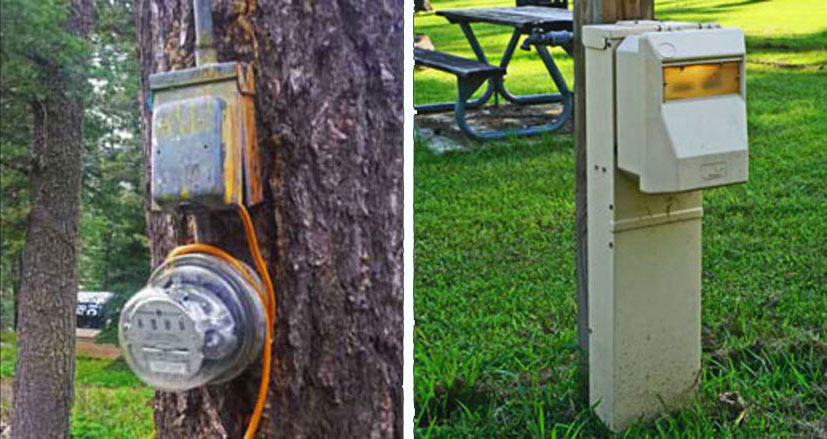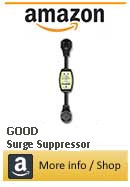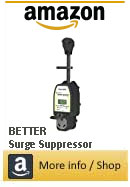I've enjoyed eight great years of interaction with thousands of other small travel trailer owners. Thanks for all your support, and hopefully a few of us will meet again somewhere in the woods or on the road! - Denny
Dangerous electrical problems are way too common!
Believe it or not, the photo at the top of the page was our actual "power pole" when camping near West Yellowstone. It is certainly the most questionable power source we've ever run into at a campground. We have, however, found better-looking power poles that had worse problems.
There are three main electrical problems to be aware of when camping. All of which can be dangerous:- Bad wiring of the power pole at the campsite
- Power surges that occur during a nearby lightning strike
- Improper electrical voltage
Bad wiring at the campsite
We're all in a hurry to get things set up when we pull into a new spot while camping. While it's tempting to just plug in your RV, you can easily destroy electrical components if the power source has problems. With a 30 amp circuit (what's common with most small travel trailers), the main problems that can exist with the wiring are:- No power
- Improper or missing ground connection
- There is an open neutral line
- The polarity is reversed
(In addition to these potential electrical problems, the 50 amp circuits used with larger trailers and RVs have two electrical sources. They are called legs and are why the connectors have an extra prong. These 50 amp circuits may also have a problem with no voltage on one of these legs.)
This is the most common electrical problem you will experience at many campgrounds. If these items sound too technical, know that they are all dangerous electrical problems. Any of these issues can cause damage to your small trailer's electrical system or the electronic devices you may have plugged in. Some of the problems could present a shock hazard; something you certainly want to avoid. You should always test the power to find out if you have a problem before you connect your trailer's electrical plug.
Power Surges from nearby lightning strikes
The next one of the dangerous electrical problems you will run into when camping is a power surge. We spent over 30 years living in the Orlando area. Central Florida is the lightning capital of the world. We certainly understand the danger of lightning and how it creates problems.
Two things that come along with lightning are power failures and surges. A surge is when the power voltage spikes, or in other words goes much higher than it should. It happens frequently when there are lightning strikes in the area but can happen from other things too as described next.
A bad power surge from a nearby lightning strike can cause enough electricity to damage your trailer. It can destroy electrical circuits, your power converter, and other electronic components. Any electronic devices you have plugged in when a bad surge occurs can also be damaged. While it's rare, an electronic device taking a hit could also cause a fire. A bad power surge is the most damaging electrical problem commonly experienced while camping.
PLEASE NOTE: Nothing will protect you from a direct lightning hit
Improper Electrical Voltage
Sometimes you'll find that the electrical voltage is too high or too low. We've stayed at places where it would fluctuate. It would be fine most of the time, but would randomly become too high or too low. While this may not be as extreme as a power surge caused by lightning, it can also damage your trailer's electronic components.
The problem is generally caused by an inadequate electrical system. Often you will notice the problem if large equipment located nearby starts up or stops. You may have experienced a smaller version of this in your home if you've ever noticed the lights dim when your A/C kicks in. While this is a concern, it generally causes the least damage (if any) and by itself doesn't normally present a significant danger.

A good surge suppressor is the best way to protect your small travel trailer from lightning strikes nearby
Why you need a good Surge Suppressor when camping
- To reduce the likelyhood of troubles that arise from wiring issues at a campsite, you need a device that will test the power at the pole and indicate any that exist problems.
NOTHING WILL PROTECT YOU FROM A DIRECT LIGHTING HIT. And while you cannot completely eliminate the possibility of damage due to a bad power surge, you can substantially reduce the probability. A surge suppressor is designed to take the hit and prevent the surge from entering your trailer.
When a small surge occurs, the device will absorb it. But if a strong surge from lightning happens, the surge suppressor will often get damaged and need to be replaced. The good thing is that replacing it is a lot cheaper than dealing with all the damage it prevents.
- Some devices will also prevent problems from improper electrical voltage and fluctuations.
So what should you get?
There are three main options to consider, based on the level of protection and convenience you want. Of course, your budget is also a consideration.
The easiest and most affordable solution is to get an inline surge suppressor with a built-in circuit analyzer. This is a portable device that plugs into the campsite's power pole. The power cord from your trailer then plugs into it.
You can also get devices that are permanently installed in the trailer. They are nice but do have some disadvantages as I explain below.
OPTION 1 (GOOD) - A basic, portable in-line surge suppressor for RVs and Trailers

A basic, portable in-line surge suppressor will help prevent electrical damage to RVs and Trailers
This is the type that saved us a lot of money. We had a Surge Guard 30 Amp Portable Surge Suppressor (shown on the left above) for many years. A few years ago our trailer got hit with a bad surge during a lightning storm. The surge suppressor took the hit and had to be replaced. The trailer and electronic devices were unharmed. In other words, it did what it was supposed to do.
A unit like this provides good protection against power surges (item #1 above). It also has indicator lights that let you know if the campground wiring is correct or has any issues (item #2 above). These are by far the most common and important functions and will help you to prevent the most damaging problems. A device like this, however, will not help you with item #3 above.
PLEASE NOTE
When updating this article, I found an almost identical device that has even better recommendations on Amazon. It's called a POWSAF RV Power Defender and is the one I'd purchase now.
OPTION 2 (BETTER) - A high end, portable in-line surge suppressor (often referred to as an Electrical Management System or EMS)
Denny's Choice

A high-end, portable in-line surge suppressor, often referred to as an EMS
This is the device we have now. After our original surge suppressor took a hit, I decided to spend the extra money and upgrade to one of these. Like the basic unit, it addresses items #1 and #2 above, but also helps with item #3. If the campsite voltage drops below or exceeds a certain level, it turns the power off. It will turn it back on once the voltage returns to an acceptable level.
A few other nice features it has are:
- There is a delay when it is first connected to the power (or when you turn on the breaker). During that time it runs diagnostics. This is a great feature should the power go out for any amount of time while your trailer is connected with the Air Conditioner running. The delay will help prevent damage to the A/C compressor if the power just hiccups and is out for a few seconds.
- Instead of simple indicator lights like the basic unit above, this device has a digital display that provides more information and the status.
We've had this one for a few years now and I do like the additional features. But if we were just getting started again, I'd still feel good about buying the basic one above to save some money.
OPTION 3 (TECHNICALLY THE BEST...but with a few disadvantages)
- A permanently installed EMS
PLEASE NOTE: I try to write about our own personal experiences. In this case, I've never actually owned one of these. The following information is what I have learned by reading and talking with other campers.
This is the upper-end solution, and typically what's pre-installed in many large RVs. It has all the protection of the "Better" device above, plus usually a few other bells and whistles. However, it also has some disadvantages.
- Price - These are more expensive than the portable in-line devices
- Additional Cost - They must be installed by a professional
- Replacement Cost - Should the unit take a hit and need to be replaced, you will likely face the same high costs again
- Loss of Power - If the unit fails for any reason, you will have no power in your trailer until you get it repaired or replaced
For us and our budget, it doesn't provide enough additional benefit to justify the additional cost.
How to use a portable in-line surge suppressor with your small travel trailer
Using a device like the ones we've had is simple. Here's the best procedure to get things connected:
- Make sure the correct breaker in the power pole is turned off.
- Connect the surge suppressor to the power pole connector.
- Turn on the breaker.
- Check the indicator lights or display on the surge suppressor to make sure there are no problems with the campsite wiring. If you are using a device like our current one (BETTER above), wait for the delay and allow the diagnostics to be completed.
- If a problem is indicated, stop and go tell them at the campground office. They will usually either send someone out to deal with the problem or move you to another site.
- If there are no problems, turn the breaker back off.
- Connect the power cord from your travel trailer to the surge compressor.
- Turn the breaker back on.
When you are packing up to go, simply turn off the breaker first, then disconnect everything and put it away.
Please don't take a chance with this
Protecting yourself against dangerous electrical problems when camping should be a top priority. Don't put off spending the money now and end up regretting it later. Be sure to send me a note if you have any questions.
- Denny
P.S. If you are on a very tight budget, check out my other article: Low-Cost Way to Test for Campground Wiring Problems. It describes a very low-cost device that you can use to at least test for the most common electrical problem at campgrounds.

Denny Johnson
After having spent most of our adult life in Orlando, my wife Fay and I moved to Knoxville, TN in 2020. We are loving the change of seasons and being near the mountains. Plus, this part of the country is loaded with great places to camp.We camped years ago with a pop-up camper, but got serious about it when we purchased our Casita in 2014. There was a lot to learn as we started traveling with it, and a lot of conflicting opinions on line. That's when I decided that creating a website would be a good retirement project. I started tinyTowable.com to share things we've learned along the way that have worked well for us in hopes that the information would be of help to others.
However, since moving to Tennessee, I've gotten involved with new hobbies (you can check some out on my personal website at https://www.softrite.com) and we haven't camped very much. So, at the end of 2023, I made the tough decision to stop updating this website.







10 thoughts on “Avoiding Dangerous Electrical Problems at Campgrounds”
Thanks for posting. After two years of use our monitor/surge protector warned us about an “open ground” and would not run power to our camper. The campground manager can to check it. Seems they had recent hurricane damage, replaced some posts and it was miss wired. Worth the money!
For us too, it’s just like any other insurance. You hope you never need it, but if you do, you’re glad you have it!
Thanks for taking the time to write this article, I found it very useful and educational Denny!
Thanks for the feedback Wendy!
– Denny
Does this also check for low voltage
The one we have does not Jeff. There are more expensive ones that do. It all depends upon how much you are willing to spend. You’ll never protect against everything (like direct lighting hits), but I feel like what we use covers the most common issues.
That…is the(e) most concise & informative article regarding RV surge protectors. Thks
Thanks for the great feedback Ejp. Glad you enjoyed it. -Denny
Awsome info about campground electric. I ended getting the Hughes Autoformer for my rig. I know for a fact it has saved my electronics from low voltage in the hot summer when everyone is using there ACs
Glad you enjoyed the article Mike, and glad to hear you’re protected! – Denny